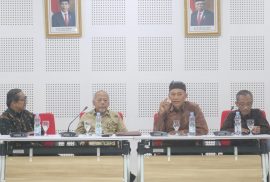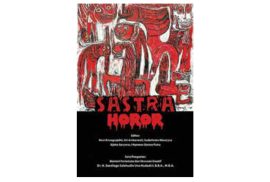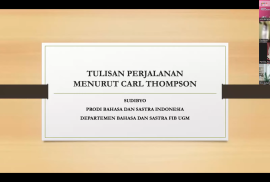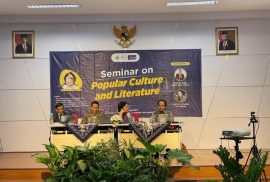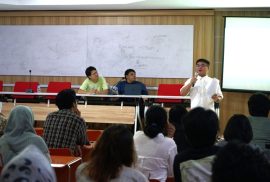Yogyakarta, June 4, 2024 – The Arabic Literature Study Program of Universitas Gadjah Mada held a National Seminar on “Arabic Language Development in Various Media” held at Soegondo Building S709, Faculty of Cultural Sciences, Universitas Gadjah Mada. This event was held by the UGM Arabic Literature Study Program as a form of respect and appreciation for the dedication given by Dr. Moh. Masrukhi, M.Hum., who has devoted himself for 35 years in the world of education.
The event was attended by Suray Agung Nugroho S.S., M.A., Ph.D., as Vice Dean of the Faculty of Cultural Sciences (online), Dr. Sudibyo, M.Hum., as Head of the Department of Language and Literature, Dr. Zulfa Purnamawati, S.S., M.Hum., as Head of the Arabic Literature Study Program, lecturers and colleagues of Dr. Moh. Masrukhi, M.Hum., as well as students and alumni.
The event began with the opening by the MC, recitation of the holy verses of the Qur’an, singing Indonesia Raya and Gadjah Mada Hymn, remarks, National Seminar program, delivery of impressions and messages, tumpeng cutting procession, giving mementos, reading prayers together, and ending with closing.
The National Seminar “Arabic Language Development in Various Media” was hosted by Dr. Arief Ma’nawi, S.S., M.Hum. as moderator with three speakers:
- Prof. Dr. Syamsul Hadi, S.U., M.A., discussed about “Form and Meaning in Fi’il Tsulatsi and Ruba’i”. He explained that the meaning and form of verbs in Arabic are very numerous and there are 58 forms that have never been revealed. This research will provide new convenience in the productivity of the formation of fi’il mazid. in terms of form and meaning, as well as in terms of meaning and form.
- Prof. Dr. H. Tulus Musthofa, L.C., M.A., with the topic “The Development of Semantics in Arabic Viewed from Modern Linguistics”, highlighted the development of new meanings in old words, when conditions and situations affect the meaning, and also the many uses of language in different situations and uses.
- Dr. Moh. Masrukhi, M.Hum., who presented on “Verbal and Nonverbal Elements of Egyptian Print Media Commercial Advertisements: Discourse Analysis”, explained that every advertisement contains a message as well as meaning. Advertisements in Egypt besides having a semantic form, also have a semiotic form. Most magazine advertisements in Egypt do not express verbal elements, but express nonverbal elements. Ads also have nonverbal elements that can be interpreted contextually.
Through the National Seminar “Arabic Language Development in Various Media”, it is hoped that the research that has been carried out can be published and widely accessed and individual and institutional research cooperation will be stronger.

